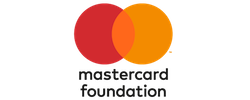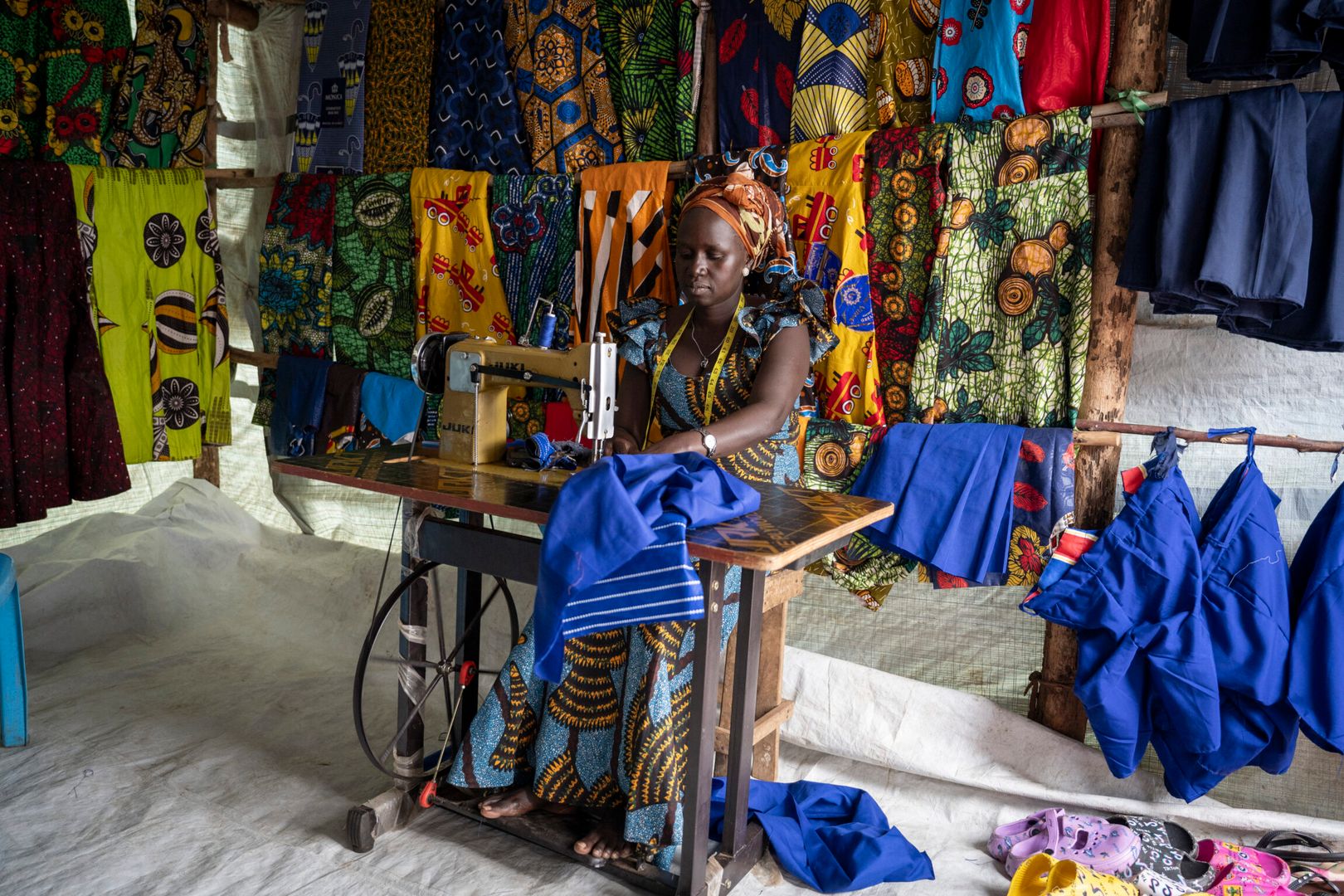The Issue
Uganda has the world’s youngest population and is also the largest refugee-hosting country in Africa with over 1.5 million refugees, of whom 60% are young people. In refugee and host communities, young people face several challenges such as high poverty and unemployment rates attributed to several barriers in finding or creating employment. These barriers include limited access to quality and market-driven skills, limited access to credit, lack of learning opportunities to develop practical skills, limited business/entrepreneurial skills, lack of industry connections, discrimination, and long periods of inactivity due to conflict and displacement.
The Project
DCA and a consortium led by Muni University are implementing the Refugee and Host Community Youth Empowerment and Transformation Initiative (RETI) program in Uganda. Funded by the Mastercard Foundation, the program addresses unemployment among young people aged 15-35 in 15 refugee hosting districts, reaching 100,000 (60,000 female) and 70,000 (42,000 female) individuals. It provides educational and job opportunities, mentorship, internships, counselling, and mental health services to help refugees transition into the labor market.
The program also fosters networking and resource sharing among the youth. It aims to provide quality training and skilling to 100,000 young people in refugee and host-communities (70% refugees and 60% female), addressing the growing demand for education and skills development. More specifically, the program will train 100,000 young people in life skills; train and certify 88,000 in non-formal vocational and business skills; skill 6,000 through short courses in the three universities; skill 2,000 through internships/apprenticeships; and 4,000 young people will receive digital literacy and innovation skills.. Thereby, the project contributes to reaching the increasing demand for education and skills development for young people.
On the supply side, the program will strengthen the capacity of universities, local organizations, and Technical and Vocational Education and Training (TVETs) to be responsive to the needs of young people including refugees, hosts, and those with special needs.
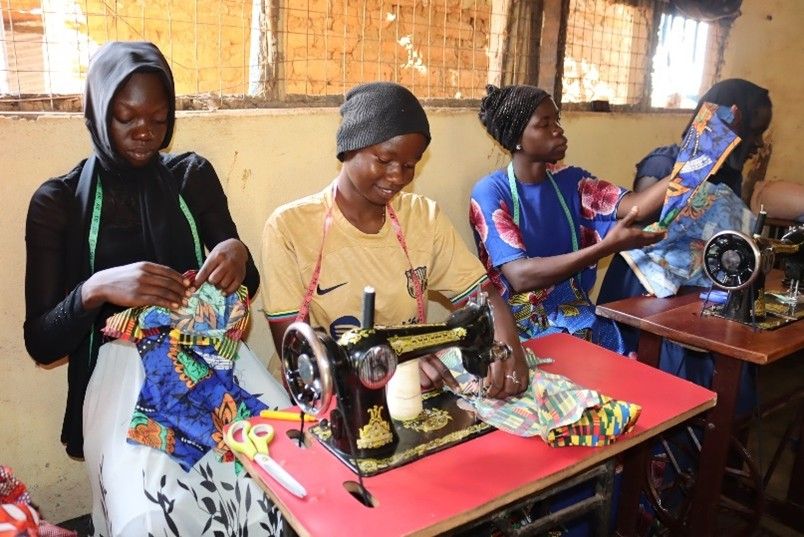
The Change
The program aims to improve young people’s access to financial products and markets by providing financial literacy, utilise digital platforms for employment, supporting the formation and digitalization of 1,700 youth savings and loan associations (YSLAs), linking 1,000 existing YSLAs to youth-friendly financial services and products; provide 20,000 young people with business incubation support, provide 7,500 with innovation grants and link at least 10,500 to formal employment.
The key interventions include training and skilling, financial inclusion and market access, enterprise support, and employment support provide the framework through which refugee and host community young people will attain market responsive and transition skills to work. This will result in young people demonstrating improved skills acquisition, an increased number of young people linked to formal employment and starting or expanding their businesses.
Additionally, the young people will receive life skills like psychosocial support, mentorship, and sexual and reproductive health to equip the young people to mediate challenges in their lives and enable a smooth transition from the learning phase into employment. Thus, ensuring that young people are productive and transition to both wage and self-employment opportunities. In doing so, the program will contribute to strengthening the individual capacities of participants, and subsequently capacities of their employers and families.
The project also works toward systemic changes such as shifts in policies, resource flows, positive mindset-change, relationships, and power dynamics. However, while it may take time to realise these systemic changes, there is a need to intentionally work towards them.
The Results
Key Achievements in 2024
- Trainer of Trainers (ToT) Training: A total of 45 participants (30 males, 15 females) attended a 5-day ToT session. This group included 35 local artisans (23 males, 12 females) and 10 Community-Based Facilitators (CBFs) (7 males, 3 females). The training covered critical topics, including life skills, group dynamics, financial literacy, business planning and entrepreneurship, and the Village Savings and Loan Association (VSLA) methodology. The anticipated possible outcome is enhanced capacity among local artisans and CBFs to train young people effectively in vocational skills and business planning.
- Youth Dialogue for International Youth Day: In commemoration of International Youth Day, DCA organized a youth dialogue under the theme “Skills Development for the Enhancement of Youth Opportunities,” attended by 58 youth representatives and 14 stakeholders from local government, the private sector, training institutions, and development partners. Participants addressed opportunities, challenges, and recommendations for skills development initiatives, and young attendees showcased their products during the event in Kululu Sub-County, Yumbe District
- Transition to Work-Based Learning: A total of 2,124 young people (972 males, 1,152 females) transitioned from vocational skills training to work-based learning as they entered the third month of training in September.
- DIT (Directorate of Industrial Training) Registration: 2,072 young people (937 males, 1,135 females) were registered to sit for the DIT assessment. This included 708 participants (248 males, 460 females) from Terego, 156 participants (71 males, 85 females) from Koboko, and 1,208 participants (617 males, 591 females) from Yumbe. Registrations were completed through the Training Quality Assurance System (TQAS) for DIT under four registered institutions: Jabara Agricultural and Vocational Institute (Koboko), Esta School of Technology and Agricultural Innovation, Isabel Mateos Technical and Agricultural Institute (Yumbe), and Omugo Technical Institute (Terego).
- Formation of Youth Savings and Loan Associations (YSLAs): A total of 63 YSLA groups were formed, comprising 1, 601 members (567 males, 1,034 females). Specifically, 36 groups with 878 members (301 males, 577 females) were formed in Yumbe, 22 groups with 579 members (200 males, 379 females) in Terego, and 5 groups with 144 members (66 males, 78 females) in Koboko. These empowered youth through financial literacy and savings, enabling them to access funds for business ventures.
- Attendance at Training Sessions: A total of 2,103 participants (860 males, 1,243 females) on average attended the 5-day training sessions in Koboko, Terego, and Yumbe. The training covered life skills, group dynamics, financial literacy, VSLA methodology, and business planning/entrepreneurship.
- Preparatory meetings for DIT assessments: Meetings were conducted with local artisans, training centres, and stakeholders to prepare for the DIT assessments. A total of 132 participants (87 males, and 45 females) attended these meetings, including local artisans, training centre representatives, community-based facilitators, and project staff. This included 38 participants (21 males, 17 females) from Terego, 3 participants (2 males, 1 female) from Koboko, and 91 participants (59 males, 32 females) from Yumbe. The meeting in Yumbe combined participants from both Yumbe and Koboko, while Terego held a separate session successfully led by local artisans and training centres.
More broadly, a functional community-based feedback mechanism for the RETI project has been established. This includes a toll-free line and a smartphone for capturing community complaints and feedback, and distributing registration forms for complaints and feedback to community-based facilitators and project staff. It has received 2,717 applications from young people for vocational skills training and work-based learning in Yumbe, Koboko, and Terego districts, and identified 91 local artisans to provide these training and learning opportunities.
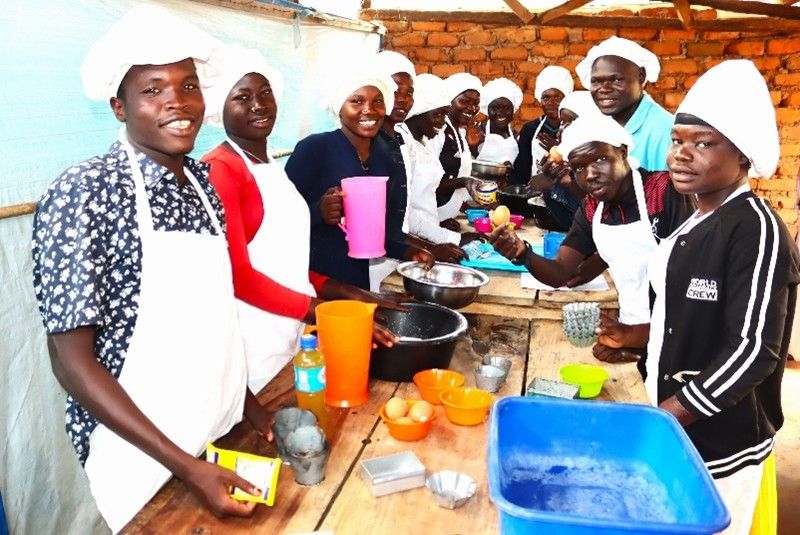
The Partners
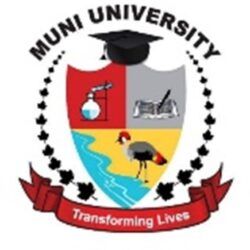
The program is implemented through a consortium of nine partners, including three universities: Muni University, Gulu University, and Bishop Stuart, as well as six other partners: DanChurchAid, Finn Church Aid, Community Empowerment for Rural Development, PALM Corps, Meeting Point Kitgum, and Young African Refugees for Integral Development. The Consortium is led by Muni University, and together, the partners have vast knowledge and experience in working on skilling initiatives based on market needs.
Our Work
Through the goal of “Building Resilient Communities“, DCA focuses on building the economic, social, and environmental resilience of marginalized communities by increasing their production, income, and employment opportunities. DCA economically empowers marginalized young people by equipping them with marketable skills that enable them to become competitive in the workplace.
About this project
Title: Refugee and Host Community Youth Empowerment and Transformation Initiative (RETI)
Period: 1st June 2023 – 31st May 2027
Partners: The program is being implemented through a consortium of nine partners: Muni University, Gulu University, and Bishop Stuart University, as well as Finn Church Aid, DanChurchAid, Community Empowerment for Rural Development, PALM Corps, Meeting Point Kitgum, and Young African Refugees for Integral Development.
Amount: 27,358,466 USD
Number of people reached: 100,000 (60,000 female)
Donor: Mastercard Foundation
